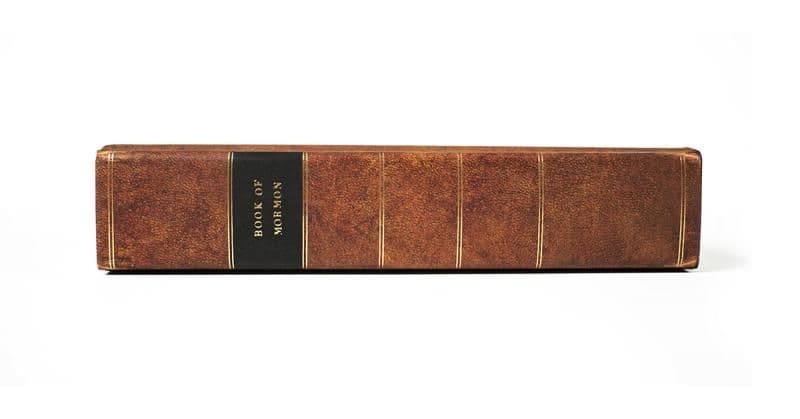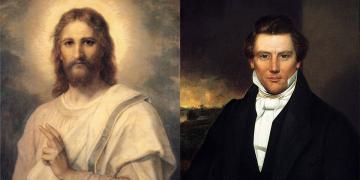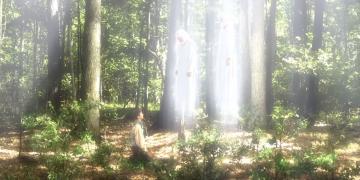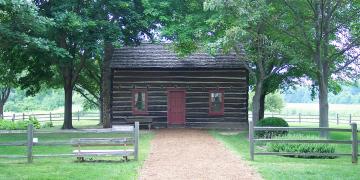April 3, 2020
Celebrating the Restoration Day 5: The Book of Mormon as the Handbook of Church Administration
Post contributed by
Welch, Jack

On the final day of this week, I hope you will take a few minutes to appreciate the array of administrative patterns and guidelines found in the Book of Mormon. While this sacred record contains lots of inspiring doctrines, faithful histories, genuine spiritual experiences, and elegant expressions of profound truths, the Book of Mormon also contains a surprisingly vast array of instructions for the administration of the Church, in the performance of ordinances, regarding the duties of Church members, and much, much more. All of this is for the building up of the Church of Jesus Christ as a faithful and holy community.
As I say in the chapter below, which was published by the BYU Religious Studies Center, the Book of Mormon is truly the Keystone of our Church Administration. It was consulted much more often than people have realized as the first de facto handbook of instructions for the Church. As much as possible, it was used by every leader. It was followed by every member. It was read often by Joseph Smith, especially as he supervised the publication of the 1837 and 1840 editions.
It was followed, sometimes deliberately, other times in general, but always in detail and in principle. In it was found the words for the baptismal prayer, and for the administration of the sacrament. In it were found instructions for preparing to serve as missionaries. In it a quorum of twelve disciples was established to carry forth the work and words of the Lord. In it members were exhorted to pray in their families. And much, much more. As Joseph Smith once said, "The Book of Mormon is the keystone of our religion." We owe more to the Book of Mormon in our daily observance of life as Latter-day Saints than we usually are aware.
So, consider the helpful list below. Use it as you follow along in this publication. Think: Where would we as a church be without the Book of Mormon? Where would you be personally without this precious information found only in the Book of Mormon? May this book help us all as we truly strive to embody the will of the Lord Jesus Christ in this amazing era of the Dispensation of the Fullness of Times.
“Ye know the things that ye must do in my church . . . for that which ye have seen me do even that shall ye do. Therefore, if ye do these things blessed are ye, for ye shall be lifted up at the last day” (3 Nephi 27:21-22).
The name of the Church of Christ (3 Nephi 27:8–9)
The Doctrine of Christ (3 Nephi 11:31–40)
The Gospel of Christ (3 Nephi 27:13–21)
Acting in the name of Christ (3 Nephi 27:7)
A single prophet-leader (2 Nephi 5; Alma 1; Helaman 7; 3 Nephi 7:25)
A quorum of twelve (3 Nephi 12:1; 19:12), “give heed unto the words of these twelve” (12:1)
Three leaders with exceptional powers (3 Nephi 28:2–12)
Three Witnesses (2 Nephi 27:12; Ether 5:4)
Presiding (Mosiah 26:37; “to preside and watch over,” Alma 6:1; 3 Nephi 28:18)
Uniformity, “a regulation throughout the Church” (Alma 6:7; 45:21; 62:44)
The process of making administrative changes (Mosiah 29; 3 Nephi 15:1)
Leaders called of God by prophecy (1 Nephi 2:22); “callings” (Jacob 2:3; Moroni 6:4; 7:2; 8:1)
Dividing the people into 12 groups of about 250 people each (3 Nephi 19:4)
Dividing into groups of 50 per priest (Mosiah 18:18), or seven congregations (Mosiah 25:19–23)
The pastoral duties of church leaders (Mosiah 18:19–23)
Consecration of priests and teachers (2 Nephi 5:26; Mosiah 23:16–18, “just men”; 25:19)
Ordination of priests and elders (Alma 6:1)
Ordination by the laying on of hands (Alma 6:1; Moroni 2:2)
Procedures and actual words used in ordaining priests and teachers (Moroni 3:1–4)
Priesthood authority to baptize (Mosiah 18:13; 3 Nephi 11:19–22)
A higher priesthood authority to bestow the gift of the Holy Ghost (3 Nephi 18:14–17; Moroni 2)
Priesthood after the Holy Order of the Son of God, associated with Melchizedek (Alma 13:1–10)
Faith as the first principle in joining the Church (Alma 32)
Examples of study, prayer, change of heart in conversion (Alma 17–26)
Repentance (Mosiah 4:10; 11; 26; Alma 5; 9; 12; 42; Helaman 7; 13; 3 Nephi 30:2)
Confession (Mosiah 26:9; “did confess their sins and were baptized” Helaman 5:17; 16:1; Moroni 6:7)
Offering of a broken heart and contrite spirit (3 Nephi 9:20; 12:19; Moroni 6:2)
Obtaining and retaining forgiveness (Mosiah 4:26; Alma 5)
Covenant making, remembering, and keeping (Mosiah 5:1–10; Mosiah 18:13; 3 Nephi 18)
Taking upon them the name of Christ (Mosiah 5:10–12; 25:23; 3 Nephi 27:25; Moroni 6:3)
Children cannot repent (Moroni 8:19, 22)
Infant baptism is abhorrent (Moroni 8:20–21)
Only those are accountable who are “capable of committing sin” (Moroni 8:10)
“The gate by which ye should enter is repentance and baptism” (2 Nephi 31:17)
The words of the baptismal prayer (3 Nephi 11:26–27)
Baptism by immersion unto repentance (Mosiah 18:14–17; Alma 6:2; 3 Nephi 11:26)
Baptizing in the name of Jesus Christ (3 Nephi 18:11; 27:16; 30:2; 4 Nephi 1:1)
Procedures and words used for giving the Holy Ghost (Moroni 2:2)
Numbering members among the people of the church (Mosiah 6:4; 26:35; Alma 6:3; Moroni 6:4)
The administration of the Sacrament (3 Nephi 18; Moroni 6:6)
Disciples bring the bread and wine (3 Nephi 18:1)
The people sit to receive the sacrament (3 Nephi 18:2)
Priesthood holder ordained to break the bread before it is blessed (3 Nephi 18:5)
The priests kneel down with of the Church (Moroni 4:2)
The words of the sacrament prayers (3 Nephi 18:7, 10-11; Moroni 4–5)
Disciples give it to “all those who shall believe and be baptized” (3 Nephi 18:5)
Blessing children (3 Nephi 17:21–24)
Healing the sick (Alma 15:5–11; 3 Nephi 7:22; 17:7–9; 4 Nephi 1:5; Mormon 9:24)
Patriarchal, father’s blessings (2 Nephi 1–4; Alma 36–42)
Gifts of the spirit, deny not the gifts (Moroni 10)
Fasting in private (Mosiah 27:22; Helaman 3:35; Moroni 6:5)
Praying in private (Enos 1:4; Alma 33–34; 3 Nephi 13, 19)
Praying in the name of Jesus Christ (3 Nephi 18:19, 23, 30)
Worshiping in whatsoever place one might be (Alma 34:38)
Living in thanksgiving daily (Mosiah 18:23; Alma 34:38)
Family prayer (Alma 34:21; 3 Nephi 18:21, “pray in your families unto the Father”)
Parental duties to teach and care for their children (1 Nephi 1:1; Mosiah 24:14–15; Alma 37:35)
Polygamy allowed only if the Lord of Hosts commands his people (Jacob 2:27, 30; 3:5)
Welfare and giving to the poor (Jacob 2:19; Mosiah 4; 18:27; Alma 1:27; 34:26–29; 35:9)
Having property in common, consecration (3 Nephi 26:19; 4 Nephi 1:3)
Tithing (3 Nephi 24:8–10)
Building Zion, the New Jerusalem, in this land (3 Nephi 21:22–25)
Moving to new lands, flight into the wilderness (Lehi, Mosiah)
Purposes and conduct of church meetings and worship (Moroni 6)
Praying together (Alma 6:6; 3 Nephi 19; 4 Nephi 1:2; Moroni 6:5)
Fasting together (Alma 6:6; 4 Nephi 1:2; Moroni 6:5)
Singing (Alma 5:9, 26; Ether 6:9; Moroni 6:9)
Preaching, exhorting, as led by the Holy Ghost (Moroni 6:9)
Meeting “one day in every week” (Mosiah 18:25)
Keep the Sabbath day holy (Mosiah 18:23)
Keeping the commandments of the Lord (4 Nephi 1:12)
Holding conferences (Mosiah 2–5; Alma 5, 7)
Administering covenant renewals (Mosiah 5; Alma 5; 3 Nephi 18)
Voice of the people, common consent (Mosiah 29:25–29; Alma 2:3; 4:16; 27:21–22; Hel. 1:5–8)
Forgiveness (Mosiah 26:30, “as often as my people repent I will forgive them”)
Inviting all to hear the word of God (Alma 6:5; “all are alike unto God,” 2 Nephi 26:33)
Including the children in the congregation (Mosiah 2:5; 3 Nephi 17:25; Moroni 8)
Volunteerism (2 Nephi 26:31, “the laborer in Zion shall labor for Zion”)
Unpaid ministers (2 Nephi 26:31, “if they labor for money they shall perish”)
Priests “should labor with their own hands for their support” (Mosiah 18:24)
No priestcrafts, seeking honor, riches and gain (Alma 1:16; Mormon 8:33, 37)
Temples and temple worship (2 Nephi 5:16; Jacob 2:11; Mosiah 2:1; 3 Nephi 11:1)
Prohibited iniquities, quasi-interview list (2 Nephi 26:32; Alma 1:32; 16:18; Helaman 4:12)
Disapproval of winebibbing and drunkenness (2 Nephi 15:11, 22; Mosiah 11:15)
Condemnation of abuse of women and children (Alma 14; Morianton beats maid-servant 50:30)
Higher levels of worthiness and holiness required (2 Nephi 9)
White and pure garments (1 Nephi 12:11; Jacob 1:19; Alma 5:27; 3 Nephi 19:30)
“Hosanna! Blessed be the name of the Most High God!” (3 Nephi 11:17)
“Anoint thy head, and wash thy face” (3 Nephi 12:17)
Principles of obedience (1 Nephi 22:30–31; Jacob 4:5; Mosiah 5:5, 8; 3 Nephi 12:18)
Sacrifice (3 Nephi 12:19), “pointing to the great and last sacrifice” (Alma 34:14)
Chastity (Jacob 2:28), no adultery (Mosiah 2:13; Alma 30:10; 3 Nephi 12:27–28)
Consecration, dedicate wealth to the kingdom of God (Jacob 2:18–19; 3 Nephi 13:20, 24, 33)
Promised blessings of peace and prosperity (2 Nephi 1:9, 20; Alma 36:1, 30)
The blessing of parents and children (3 Nephi 17:17, 21)
Sins forgiven and sealing powers given (Enos 1:5; Mosiah 26:20; Helaman 10:7)
Overcoming death (“death and hell must deliver up their dead,” 2 Nephi 9:11–12)
Lifted up at the last day (1 Nephi 13:37; Alma 36:33; Nephi 27:22)
Standing before God (Mosiah 16:10; Alma 5:15; Mormon 6:21; 7:6; 9:2; Moroni 8:21)
Eternal Judge of both the quick and the dead (Mosiah 2:27; Moroni 10:34)
Keeping sacred things unwritten and confidential (3 Nephi 28:16)
Not imparting the holy thing to those unworthy or unprepared (3 Nephi 14:7)
Missionary preparation (Alma 17:2–4)
Missionary work (Alma 36:24, “labored without ceasing [to] bring souls unto repentance”)
How beautiful upon the mount, proclaim the gospel (Mosiah 15:10–16)
Patterns of missionary work (Mosiah11; 18; Alma 4-15; 31-34; Helaman 6; 3 Nephi 27:1)
Companions, two witnesses (Alma and Amulek)
Traveling out as a group, then dividing up (the four sons of Mosiah)
Taking the Gospel to the Lamanites (1 Nephi 13; Alma 17–26; 3 Nephi 20)
Opening the door to the Jews and remnant of Jacob (3 Nephi 21)
Understanding God’s plan for the House of Israel (Jacob 5; 3 Nephi 21–22)
Judging the members, common judges (Mosiah 26:29, “him shall ye judge”)
Church discipline and excommunication procedures (Mosiah 26:32; 3 Nephi 18; Moroni 6)
Three witnesses required in order to excommunicate (3 Nephi 18:28–32; Moroni 6:7)
Reactivate those cast out, encourage them to repent (Mosiah 26:29–30; 3 Nephi 18:28–32)
Teachers and teaching (Jacob 1:19; Mosiah 18:25)
“Trust no one to be your teacher” except a man of God, walking in his ways (Mosiah 23:14)
Remembering and nourishing members by the good word of God (Moroni 6:4, 6)
Teach nothing except what the prophets have spoken (Mosiah 18:19)
Teach with power and authority from God (Mosiah 18:26)
Teaching youth (1 Nephi 1:1; Enos 1:1; Mosiah 1:2; Alma 57:21)
Keeping historical records (3 Nephi 23)
Making annual reports (for example, Helaman 6:6, 13)
Scriptures, keeping and guarding them (1 Nephi 6, 9; Mosiah 1–2; Alma 37:1–18)
Restoring plain and precious things that have been lost (1 Nephi 13:34)
Knowing that people will be judged out of the books which shall be written (3 Nephi 27:25)
Creating new congregational units (Mosiah 25:19, Alma’s seven churches)
Giving ecclesiastical units a geographical area (Alma 27:22, the land of Jershon)
Civic duties (Mosiah 29:27, warning if the voice of the people chooses iniquity)
Duty to defend our religion, freedom, peace, wives, and children (Alma 46:12)
Military obligations (Alma 46:20–21) and support those in combat (Alma 27:24)
Forgiving one’s enemies three times (Laban episode in 1 Nephi 3–4; see D&C 98:32, 44)
Rather simple conduct of funerals (2 Nephi 4:12; Mosiah 6:5; 29:45–46; Alma 62:52, 63:3)
Cremation disfavored (compare irregularity of death by fire, Mosiah 17:20; Alma 14:8; 25:11)
Church building decoration, not idolatrous, opulent (Mosiah 11:7–10; Mormon 8:37, “the adorning of your churches”)
Further Reading
John W. Welch, “The Book of Mormon as the Keystone of Church Administration,” in A Firm Foundation: Church Organization and Administration, ed. David J. Whittaker and Arnold K. Garr (Provo, UT: Religious Studies Center, Brigham Young University; Salt Lake City: Deseret Book, 2011), 15–57.
Jan Shipps and John W. Welch, The Journals of William E. McLellin (University of Illinois and BYU Studies, 1994), 18–24, discussing the use of the Book of Mormon in early Mormon preaching.
John W. Welch, “Book of Mormon Religious Teachings and Practices,” Encyclopedia of Mormonism (1992), 1:201–5.
John W. Welch, “From Presence to Practice: Jesus, the Sacrament Prayers, the Priesthood, and Church Discipline in 3 Nephi 18 and Moroni 2-6,” Journal of Book of Mormon Studies 5, no. 1 (1996): 120–38.



